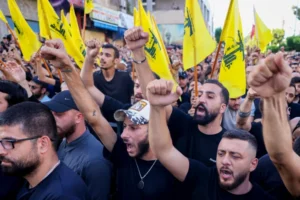Hezbollah has been dealt a heavy blow, but it can still win against Israel

Mourners attend the funeral of members of Hezbollah who were killed in an Israeli strike a day earlier, in the southern suburbs of Beirut on 21 September 2024
Samer Jaber writes in Al Jazeera on 1 October 2024:
With the assassination of Hezbollah’s secretary-general, Hassan Nasrallah, on September 28, Israel has brought the ongoing conflict to a critical juncture. The killing, which involved the dropping of dozens of 2,000-pound bombs on the densely-populated southern suburbs of Beirut, came on the tail of a violent aerial campaign that killed more than 500 people in the span of 24 hours. That was preceded by unprecedented attacks on Hezbollah’s rank and file using booby-trapped pagers and other communication devices.
All of this has provided Israel with a significant tactical advantage. If sustained alongside other tactical operations, these efforts could weaken Hezbollah’s ability to respond effectively. The attacks have dealt a major blow to the chain of command of the Radwan Force, which has not yet been deployed in this conflict, and whose involvement is contingent upon the appointment of new commanders as well as the strategic progression of the war. The assassination of Ali Karaki, the commander of Hezbollah’s southern front, although of symbolic significance, does not appear to affect Hezbollah’s capacity to continue expanding the range of fire on Israeli cities.
Israel’s ultimate goal with these attacks is to decouple its war on Gaza from the conflict in Lebanon – that is to force Hezbollah to stop supporting Hamas by attacking northern Israel. The Israeli government is using escalation as a means to achieve this goal. A successful decoupling, the Israelis believe, would create a rift among the members of the axis of resistance, which Hamas and Hezbollah are both part of.
But there is a risk that this Israeli approach will backfire. Israel may, in fact, find itself in a situation similar to 2006, when it was the stronger side but still lost its confrontation with Hezbollah due to the paradox of escalation. This is because, in asymmetric war, relatively weaker entities can win by simply employing strategic patience, prolonging the war and forcing their stronger opponent to expend significant resources, ultimately depleting them.
It is important to point out that Hezbollah cannot back down from this confrontation, even at a heavy cost in terms of its leaders’ lives. The stakes are extremely high; if it were to retreat, it would not only lose the trust and confidence of its supporters, but it could also jeopardise the strategic deterrence it has built since the 2006 war with Israel. That is why, the surviving Hezbollah leadership is likely to fight to the end.
In the present case, all Hezbollah has to do is mobilise its remaining capabilities to continue its rocket attacks on northern Israel, which will prevent the Israeli army from securing the return of evacuated residents, and resist Israeli attempts to push its forces north of the Litani River through a ground offensive.
Even if the Israeli army does not face fierce resistance, whatever advances it makes in the “limited ground operation” it just declared may be temporary. It would, therefore, face the choice of whether to expand the operation or not.
Hezbollah continues to respond to Israel’s escalation with a restrained approach, hoping to provoke it into initiating a full-scale invasion. For Hezbollah, an escalation into ground warfare offers considerable tactical advantages.
The presence of Israeli ground troops would limit the effectiveness of Israel’s air force. For example, the F-35 would not be used in areas where Israeli troops are clashing with Hezbollah due to the risk of Israeli soldiers dying in such bombardment. Other tactical aircraft may also have limited use, as Hezbollah may be equipped with anti-aircraft missiles.
